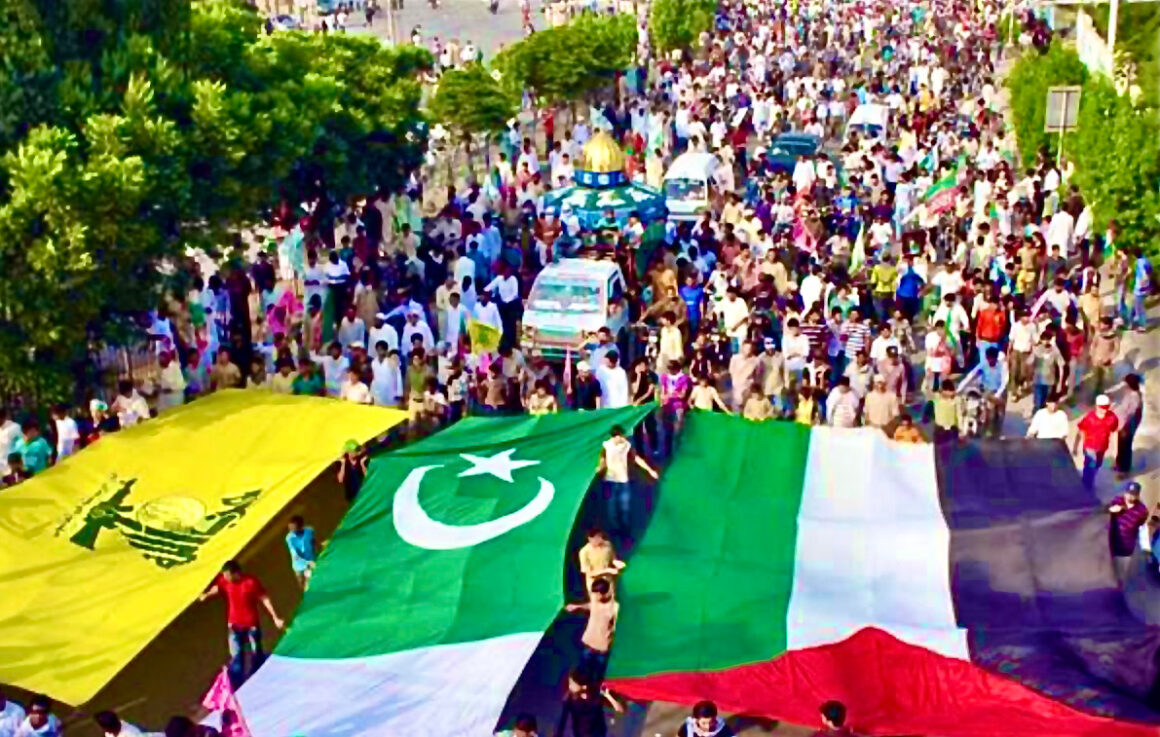If we’re going to defeat the imperial hegemon, we’ll need to place our trust in the struggles of the popular masses; not in any promises or plans from the top-down. Every victory that the anti-imperialist cause has gained comes from the efforts of the masses to beat the imperialist forces, or the liberal actors which seek compromise with these forces. Whenever we’ve seen a country defy the hegemon, whether that country is Russia, Iran, or Pakistan, the core driving factor behind these actions has been the will of the people.
This reality about where revolutionary progress comes from is crucial to understand, because when we see our cause’s victories as coming from the top-down, this creates complacency. It encourages trust within figures like Trump, who’s right now trying to sell a “peace” deal with Iran that would truly be about turning the country into an imperial client state. To combat this scheme, and orient our political practice around the mass struggle, we must clarify why the recent diplomatic breakthroughs have really happened.
All of the successful negotiations with Hamas have come about because of the strength of the Palestinian resistance, which continues to thwart the Zionist entity’s aggressions and put the empire under increasing systemic stress. Trump’s deal with Yemen has occurred because that country’s own resistance has comparably weakened the empire, forcing Washington to give in. And the India-Pakistan peace deal can be attributed not to Trump, but to Pakistan’s overwhelming show of force against the Indian fascist state.
Trump wants to turn the momentum from his supposed diplomatic victories into a project at subduing Iran, and ultimately Russia as well; but these U.S. “victories” have truly been wins for the forces that oppose U.S. hegemony, which have pushed Washington into bargaining. And it’s this empowerment of the popular revolutionary forces that represents the hope for averting a neo-colonial takeovers within Iran and Russia, as well as the East Asian war which Washington seeks to prepare for through these schemes.
There are communist parties that would strongly object to this sentiment, just because of how contentious the question of Pakistan is within the communist movement. The movement’s KKE-aligned faction, which propagates the “inter-imperialist war” narrative on Ukraine, has argued that we should side with neither India nor Pakistan in this conflict. This faction’s reasoning is that both are capitalist states, so the workers have no stake in which side wins. But as a communist who’s profoundly concerned about the influence of national-bourgeois forces, I stand by my position that Pakistan deserves our support in this case, and in any future flare-ups with India.
This is not because I disregard the importance of the working-class movement; I take this stance precisely because of how much I care about the interests of the workers. Because I see that within Pakistan, there’s a conflict between the comprador bourgeoisie and the anti-imperialist proletarian movement, with this operation against fascist India representing a victory for the proletarian side. And recognizing this lets us correctly navigate our present mission in the class war. It can let us overcome the influence of those who seek a “peaceful coexistence” between the imperialist and anti-imperialist forces, where countries like Iran would sell out to global capital.
We know that these actions by the Pakistani government represent concessions to the popular forces because this is the same stance towards India taken by Imran Khan, the former prime minister who was toppled by the empire three years ago. Khan has recounted how he did all he could to engage with the BJP regime in good faith; but then the Nazistic, pro-Zionist Hindutva ideology drove the regime to sabotage negotiations: “there was supposed to be a quid pro quo. India was supposed to give some concession, give some sort of a roadmap to Kashmir, and I was going to then host Prime Minister Modi in Pakistan. But it never materialized…I tried everything, but I came across this brick wall. And I realized it’s something to do with the RSS-BJP [the Modi-aligned ideological movement and political party] mentality where they’ve cashed in on hostility with Pakistan.”
When the Biden administration installed a puppet regime in Pakistan, this regime was welcomed by the BJP, and they strengthened ties between the two countries. But then the posture shifted again, largely because a different part of the U.S. ruling class soon took power. The Trump wing of U.S. imperialism is fully aligned with the BJP, and due to this strengthened American support, the BJP has become emboldened. It’s attacked Pakistan on the basis that Pakistan allegedly perpetrated last month’s terrorist attack, which was in all likelihood a false flag. And that Pakistan has responded with so much force is a product of the influence which the country’s popular masses hold.
Pakistan could have retaliated in a half-hearted way. It could have carried out an operation that was small enough to be symbolic, thereby telling India and the U.S. empire that it will accept further aggressions. Instead, it’s hit back so hard that India has immediately become willing to accept a truce, and the imperialist media has needed to spin the situation so that it looks like Trump is the one responsible for this.
Why has Pakistan’s government acted so decisively in countering the assaults from the empire’s proxies, even though this government was itself put in place by the empire just a few years ago? The KKE framework of analysis says that it’s because Pakistan and India are in a symbiotic relationship, and that this is essentially all theater. But that view disregards the agency and contributions of Pakistan’s working class, even though this view is supposed to represent the principled pro-worker stance. There is inter-capitalist rivalry going on; but to simplify this as all being nothing more than inter-capitalist rivalry is to ignore the progress that Pakistan’s workers movement has been making.
Is it truly a coincidence that in the same month when Pakistan’s government has carried out this operation, the country’s class tensions have greatly intensified? Is it not at all geopolitically relevant that during these last few weeks, the government has provoked uprisings from public service workers through its privatization schemes? Or that the Pakistani government has recently had to deal with militant protests against U.S. brands in response to the Gaza genocide? The government knows on some level that it exists in opposition to the masses; that it came to power in spite of the will of the people, and that it’s therefore perpetually under threat from the people. So it’s given the people a concession, in the form of delivering a serious blow against the Zionist aggressors—both the ones within India, and the ones within occupied Palestine itself.
This is absolutely a move that’s hurt the Zionist entity, because especially with Trump’s heavy investment in fascist India, a blow against the BJP is a blow against those occupying Palestine. This victory for the anti-imperialist cause cannot truly be credited to Pakistan’s anti-worker leaders, any more than it can be credited to Trump; it would be a mistake to glorify either of these class enemies. When I say that Pakistan’s military action should be supported, this is not an endorsement of the country’s capitalist regime; it’s a recognition of the Pakistani proletariat’s successes in putting stress upon their oppressors. This military operation is a response to that stress; an indication of how much power the Pakistani masses have, despite imperialism’s momentary victory over them in 2022.
Following this win for the popular masses, there will be next month’s scheduled strike by Pakistan’s trade unions, which have delayed their next action due to the conflict but are certainly in place to carry out this action. When the strike comes, the workers will be in a strengthened position, their revolutionary energy galvanized by the regime’s recent assaults against them. This will put still more pressure on the regime to break from Washington, which hopes it can get Pakistan to comply but fully intends to keep siding with India.
An inter-capitalist rivalry is developing, and the workers (both in Pakistan and across the globe) are increasingly in place to take advantage of this. We in the United States must strengthen our united front with the workers in Pakistan, and everywhere else; that’s the practical lesson we should take away from these developments. Hope cannot truly be found in the Trump administration, but great hope can be found within the class struggle.
————————————————————————
If you appreciate my work, I hope you become a one-time or regular donor to my Patreon account. Like most of us, I’m feeling the economic pressures amid late-stage capitalism, and I need money to keep fighting for a new system that works for all of us. Go to my Patreon here.
To keep this platform effective amid the censorship against dissenting voices, join my Telegram channel.








